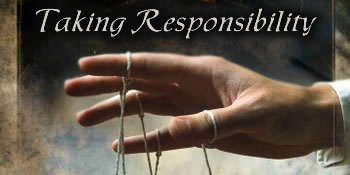
From time immemorial, perhaps our greatest failing has been our tendency to shirk personal responsibility. That was the sin of the first man. "The woman whom you gave me - she made me eat from the tree," and that sin of scapegoating continues to plague us today. Everyone is to blame for our predicaments but ourselves. Family, home, environment, school, are all implicated, and we view ourselves as helpless victims. The Torah, on the other hand, maintains that we are all granted free will and are therefore capable of taking charge of our lives.
The Talmud relates the story of Eleazer Ben Dardario, a man of unspeakable decadence, who one day felt a yearning to mend his ways. He called out to the mountains and the hills, the heavens, the earth and the cosmos to intercede on his behalf, but his plea went unheeded. Finally, in anguish, he cried out, "It appears that this matter rests entirely with me. It is only I who can plead my cause," and he wept and wept until a heavenly voice was heard: "Eleazer Ben Dardario's repentance is accepted."
Now what, you might ask, is the significance of this allegory?
Mountains and hills are code words for fathers and mothers. Eleazer Ben Dardario tried to shift blame for his immoral ways to his parents, but the heavenly tribunal would not accept his rationalization, and pointed to the Matriarchs Rachel and Leah, who were the daughters of Laban, a wicked scoundrel. Despite their father, however, Rachel and Leah were the most righteous women of all time and became the mothers of the Tribes of Israel.
Abraham, the first Jew, is another case in point. Terach, his father, was a manufacturer of idols who was willing to see his own son imprisoned. Abraham not only overcame the abuse of his father but he taught the laws of loving kindness to all humanity and proclaimed the one-ness of G-d.
Eleazer Ben Dardario was not about to give in. He tried to place blame on the heavens and the earth, his environment, his school, his friends, but once again, the Heavenly court rejected his excuse and cited Joseph who at the age of seventeen was the only Jew in Egypt (the most decadent country in the world at that time). Despite his personal pain, however, despite his abandonment, despite the compelling enticements of his environment, Joseph did not succumb. Whether in bondage, imprisoned, or as viceroy in the palace of Pharoah, Joseph remained Tzaddik - Joseph the Righteous throughout.
But Eleazer Ben Dardario continued to rationalize. This time, he pointed to the cosmos, complaining that he was born under an unlucky star. Once again, however, his plea went unheeded, for the Torah bears witness that G-d took our father Abraham and propelled him above the stars, so that we might forever know that our mazel comes directly from Him, and we must take charge of our lives.
It was only when Eleazer Ben Dardario came to terms with this that he found the courage to say, "If that be so, it all depends on me."
One of the reasons why so many people have difficulty putting their lives together nowadays is that, like Eleazer Ben Dardario, they too try to rationalize and shift the blame for their failures onto family, environment and fate.
And worse, our cultural ethos would have us believe that we are justified in doing so, that we are bound by the tyranny of our past, that, at best, our struggle is limited, if not in vain.
The message of our Torah comes as a breath of fresh air in this world of hopelessness. Yes, the Torah proclaims, it is possible to overcome a dysfunctional family. Yes, it is possible to transcend your environment, and yes, it is possible to take charge of your life - and this magic transformation takes place through accepting responsibility, through absorbing into our hearts the words of Eleazer Ben Dardario. "Yes, it all depends on me." That is the magic of Tshuva - repentance.
One of the limitations of translating concepts from one language to another is that each language is based on its own unique culture. Therefore, it is not always possible to convey the true essence of the words. Such is the problem with the Hebrew word tshuva, for which there is no parallel in the English language. Tshuva means more than repentance. Tshuva means coming home to your true self, to the realization of the potential that G-d destined for you.
Because of the magic of tshuva, even if we come from a troubled home, even if we have to struggle with a difficult environment, and even if it appears that we have nagel-no luck - we can still take charge of our lives by discovering the higher purpose for which G-d created us. Since we have all been created in His image, our potential is limitless, and it is within our hands to re-mold and re-shape our lives by accepting responsibility and returning to Him.
Rebbetzin Esther Jungreis is an internationally known author, television personality, and newspaper columnist.

